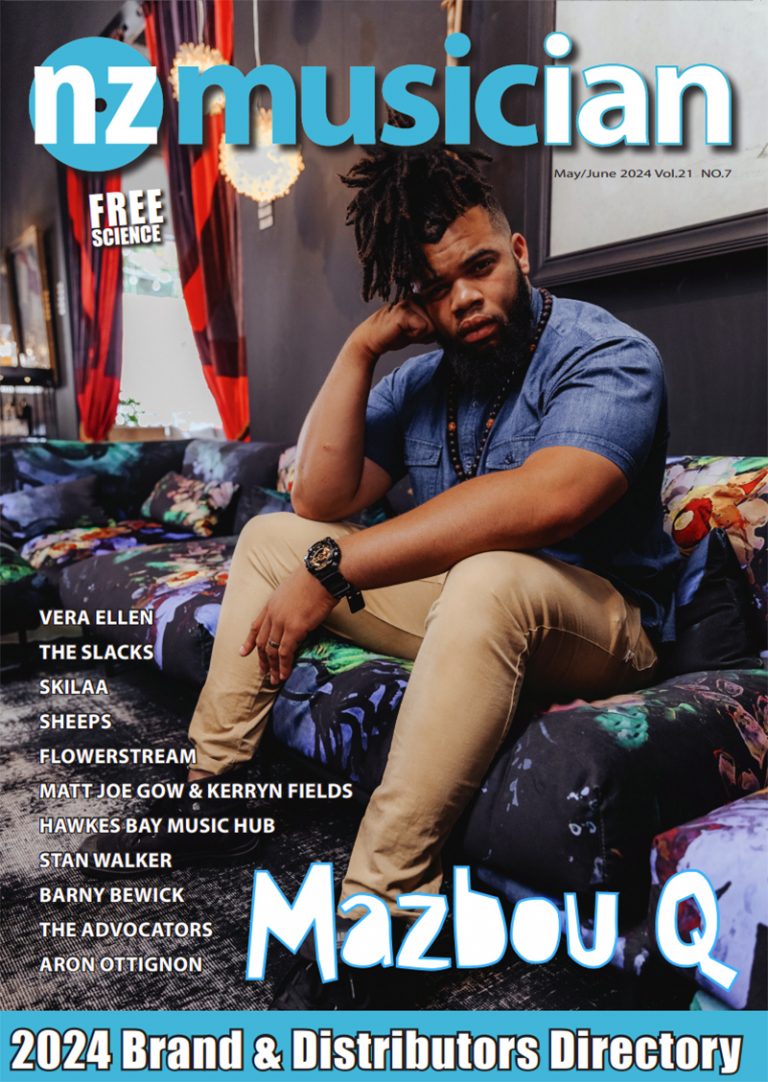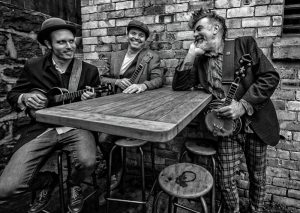The Nukes: Ditty Deeds Done Uke Sweet
The Nukes: Ditty Deeds Done Uke Sweet
Their Peas and Carrots won The Nukes an APRA award for best original ukulele song just six months after their first performance, and some six years later the Auckland ukulele-only trio is all-but fully professional, in the sense of making a living from their four-string craft. Combining the wit, wisdom and voices of three adept songwriters, their sophomore album surprises on many levels – not least because it is simply ukes and voices, with the odd happy handclap. NZM’s Silke Hartung spoke with Ben Collier and Dave Thiele about being ‘Lucky Ones’.
“I shuddered then and I shudder now at the thought of a three-piece ukulele band! If I saw that on a poster I would not go!” Dave ‘Snapper’ Thiele admits.
Meet The Nukes. You might remember mohawked Snapper’s voice from his time hosting Kiwi FM’s Voices From The Wilderness, or maybe from his days drumming for Left Anxiously Central – though that’s quite a while ago and really they only ever played live twice.
Fellow band member Ben Collier (the tall one) used to play drums in Goldenhorse, and former music teacher Dave Parker has a chart-topping song (and NZM cover) under his belt as The Parker Project with Tears On My Pillow – back in June 1991 if you care to know. Of the three, only Ben isn’t yet a full-time Nuke, though appropriately enough he works in a warehouse full of ukuleles.
Originally planned as a one-off band to open the 2008 Titirangi Festival, something clicked during their four-song set and they decided to stick together. It was a steep learning curve as neither Snapper nor Ben were confident singers.
“Dave really taught us how to,” Snapper recalls.
Six years and one album later, steady touring across both islands has seen them clock up an impressive 130,000km in the band’s trusty car. They even made it across the ditch to play in Melbourne, where they say the ukulele scene is quite different to the one in NZ. Here ukuleles are mostly about kids and the young at heart, we agree, whereas Australians take it more seriously as an alternative instrument.
The Nukes took the adult audience, all-original songs approach, and also found themselves another handy niche in the market.
“We do a lot of school shows. That actually accounts for a lot of our fitness in terms of being a live group, you know, playing to reasonably uninterested five-year-olds,” laughs Ben. “That’s a really good way to get your chops happening. If you can keep kids interested you can keep pretty much anyone interested.”
It’s hard work and an unlikely path to riches. Snapper reckons that out of 100 schools they approach, only one will go ahead. Much of the time they barely seem to break even, but they are clearly happy doing what they do, even if it does require resilience.
“It’s a big advantage to have three songwriters,” he observes. “Over six years we’ve all grown, we all say different things.”
They say there is no friction whatsoever over picking songs to play live or for the album, as most of them organically develop at jams or around live performances. Instead they give each other a lot of input and feedback along the way until there’s a song.
The Nukes’ sophomore album ‘Lucky Ones’ was recorded, mixed and mastered, from start to finish, at Bevan Galbraith’s studio in Te Pahu on the slopes of Mt Pirongia in the Waikato. Galbraith is widely known as ‘Baz’ in the local ukulele community, and himself member of Hamilton’s uke troupe Big Muffin Serious Band. The decision to record with him over a series of long weekends was an easy one.
“He’s well equipped down there to record a variety of styles of music, and he knows a lot about ukuleles. He actually makes ukes under the name Captain Ukuleles,” explains Ben.
“He knows our music, he knows his shit, he knows us and he likes us! It’s not just a job – he gets it,” Snapper adds in support. “It would have taken us three weeks in total, many long days of up to 16 hours. For the mixing we all listened. Ben and Dave have great ears, and so does Bevan. Mastering though… that’s a dark art! Who knows about that?! Well, Dave and Baz do.”
As Ben says, their first album, ‘Each To Their Own’, was a representation of their live sound to that point, and since its release in 2012 The Nukes have made quite big steps into different directions.
“We wanted to represent those steps in our current state, and to the fullest of our ability on the album,” he explains. “Playing live, occasionally people will say, ‘Holy crap, this is a massive sound for three ukuleles’ – and if you add three vocals on top of that, it’s a lot of music coming out of not much. We wanted to get as good a sound as possible on the new album, because it’s still just three ukes at the end of the day. We wanted to make that sound as big as we could.”
Only some vocals, a few lead parts and miscellaneous percussion are overdubbed, the bulk being live takes. According to Ben, a main focus was separating the sound of their ukuleles in a way that allows the listener to distinctly hear each part.
“In the last couple of years we’ve developed roles within the band. Snapper is the ‘drummer’, I’m kind of a lead player, and Dave is the bass.”
Diversifying from their previous three soprano ukes, these days the band’s instrumentation is made up of Snapper’s Tanglewood 5kg rosewood-mahagony banjolele, Ben’s Kala arch-top tenor, and Dave’s custom-built Captain Ukulele to accommodate swapping out the high G string for the low E string of a classical guitar set, tuned down two octaves from the regular ukulele G. It’s also set up with a twin stereo pickup, providing a fuller sound around bass and higher notes.
‘Lucky Ones’ is a revelation, lifting The Nukes not just well above and beyond the level of the majority of ukulele bands, (especially considering their songs are all originals), but standing comparison with any acoustic, folky songwriter acts. A variety of beautifully arranged and harmonised songs, that are unpretentious, Kiwi-as, yet neatly avoiding the instrument’s cliché’d cutsiness. At times you forget that you’re listening to music played entirely on ukuleles, somehow The Nukes manage to squeeze out a multitude of sounds – even a mean slide uke.
What is uke-typical is that they sound joyful, even when the songs deal with slightly melancholic subjects. You can almost hear the twinkle in their eyes.
“There’s a real chemistry in The Nukes,” Ben closes, and it shows.

